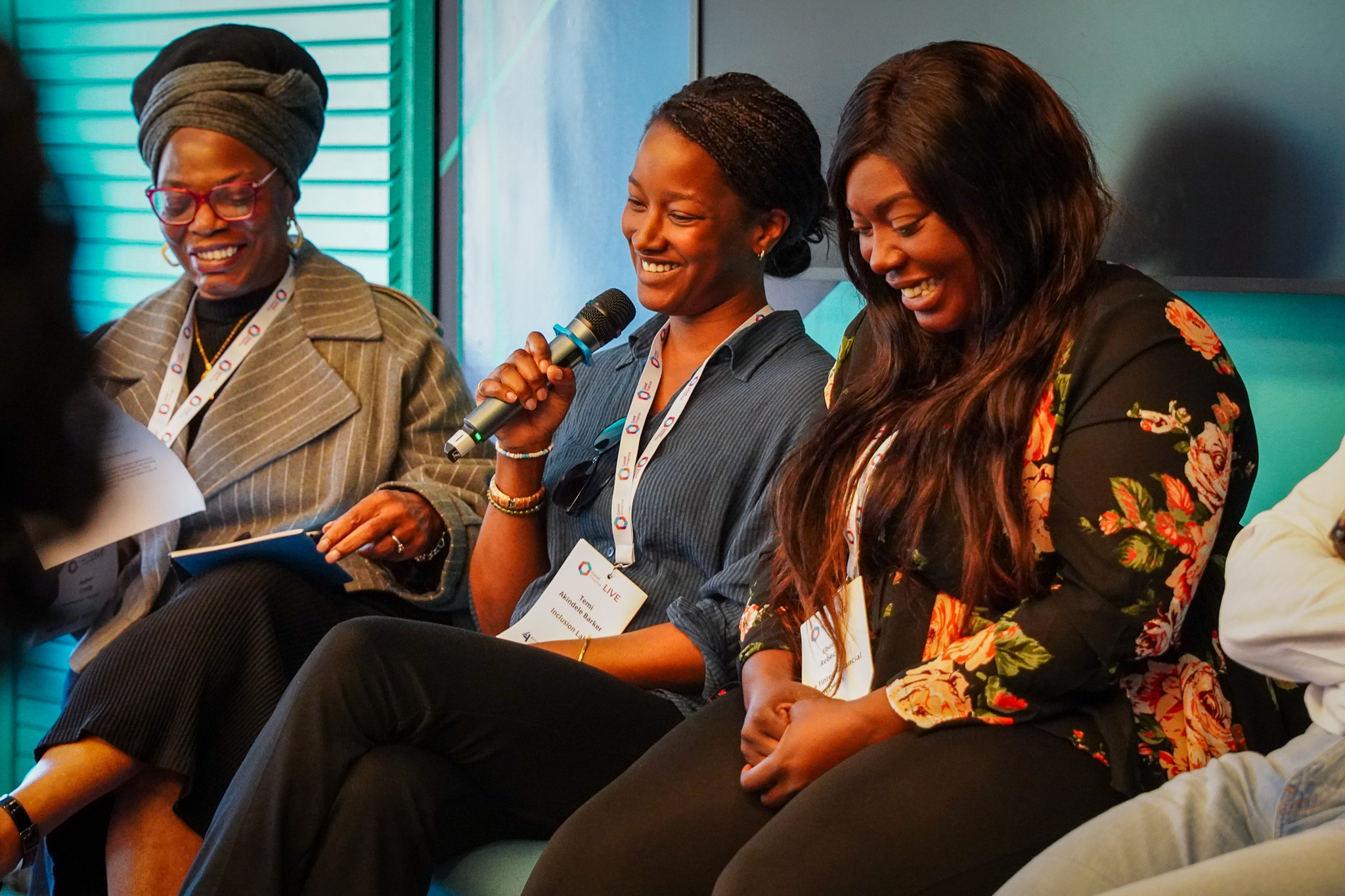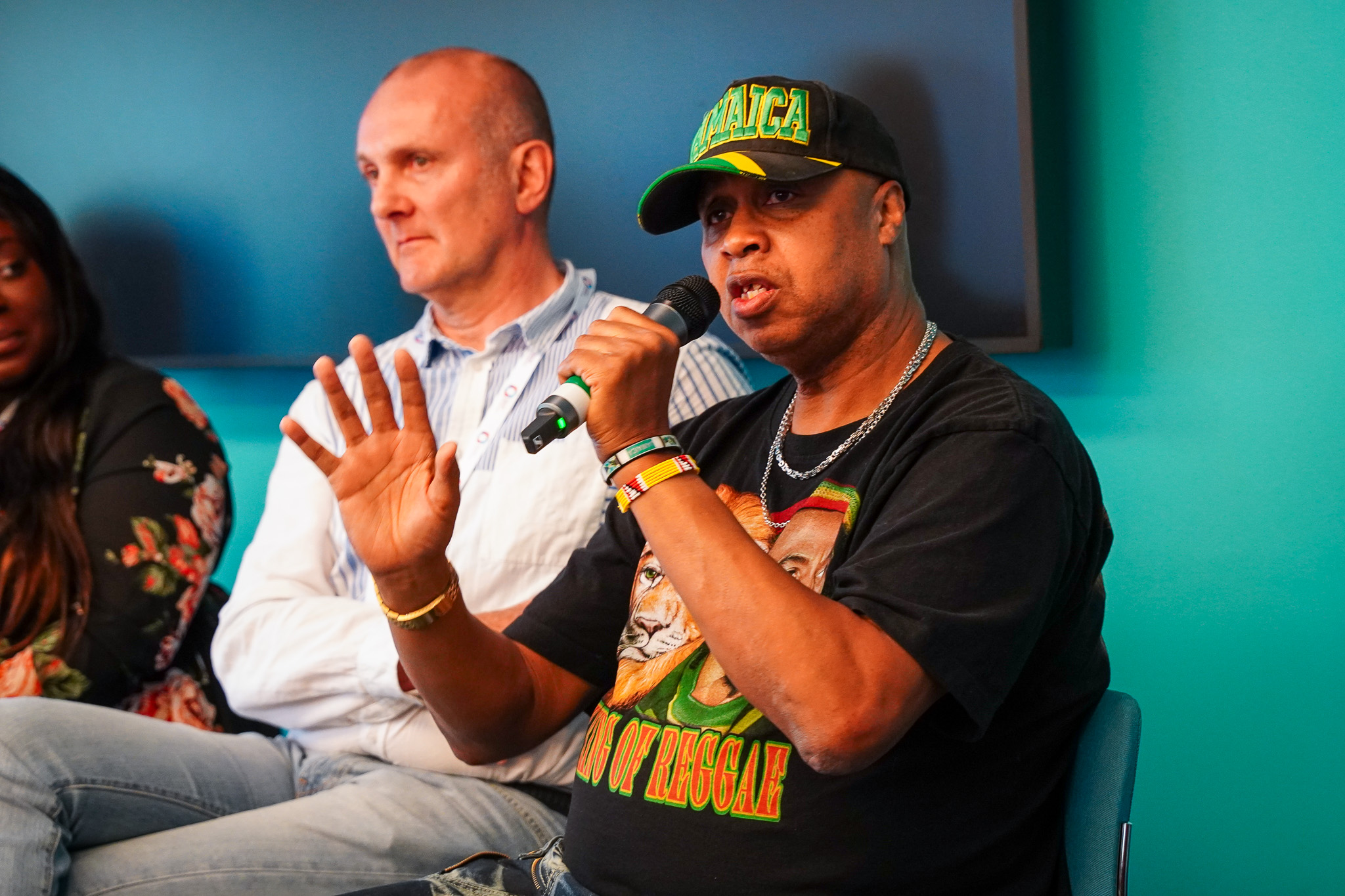Building knowledge and partnerships for social investment was the theme of Good Finance Live – an event hosted by Good Finance in partnership with Access: The Foundation for Social Investment, Better Society Capital and Pathway Fund. In the first of our 3-part blog series, we explore some of the key themes and topics from the ‘Hear from a Peer’ session, a panel of social enterprise and charity leaders who have taken social investment for their organisations.

1. Lived experience drives leadership
Personal experiences were a powerful force behind our panel’s missions, with many turning lived challenges into purpose-driven ventures. For example, Ebony spoke of how her own financial challenges inspired her to launch Rose Tinted Financial Services offering advice and support from budgeting to getting out of debt. Bob used his experience of working as a professional editor for over 20 years to found MAMA Youth Project, supporting and developing young people in the creative sector.
These stories highlighted how effective leadership is often shaped by adversity and deep personal insight.
Demonstrating resilience, authenticity, and a clear leadership identity helps build trust and long-term support. As a result, coaching and support programs should focus not only on refining business models but also on helping founders articulate who they are, what drives them, and how they’ve overcome personal and professional challenges.
2. Mentorship can be a force multiplier
Support, mentorship, and allyship emerged as critical enablers for social enterprise founders, particularly those from underrepresented backgrounds. Mentors, especially those with lived experience or institutional influence, play a powerful role in building confidence, opening doors, and guiding founders through complex processes.
The panel reflected on the value of connecting with supportive allies early in their journeys, noting that these relationships often provided access to opportunities beyond what advice alone can offer. Structured, long-term mentorship was seen as a force multiplier, particularly for those navigating systemic barriers.
3. The investment process reinforces inequities
Systemic barriers continue to affect Black and racialised-led and community-based organisations, which often face heightened scrutiny and reduced access to traditional funding. Panellists highlighted the frustrating imbalance of being over-mentored yet under-funded, calling for greater trust from investors to let organisations decide how best to use their resources.
Underrepresented founders face unique challenges in gaining visibility and credibility. The investment process, including pitching and due diligence, often reinforces inequities rather than addressing them. Panellists raised the issue of access to networks, noting that in-person events can exclude those with caregiving responsibilities or those based outside major cities.
To create a truly inclusive funding ecosystem, investors and support organisations must adapt their processes offering hybrid events, flexible pitching options, and targeted outreach to ensure equity and accessibility for all.
4. Successful partnerships are vision, strategy and mission aligned
The panel noted that successful social investment hinges on alignment between vision, strategy, and mission.
Reflecting back on what she might have done differently, Ebony shared that having self-belief was something that didn’t come naturally at the start of her organisation’s journey. “I think I would have had a bigger vision… what is a five-year vision could actually be a two to three. But it’s the fear of stability, societal expectations… who am I? How dare I?” she said.
The panel emphasised the need for more balanced relationships, where investors demonstrate genuine interest and shared passion—not just financial backing.
“My biggest learning is to look for an investor that has that right balance between getting out of the way and actually being accessible when you need them” shared Temi, reflecting that receiving investment can feel that it comes with an additional mental pressure to be making ‘the right decision’.

5. Social investment can be a powerful tool to support growth, credibility and scale impact
The panel credited the role social investment plays in helping organisations grow, enhance their credibility, and expand their impact. Beyond providing funding, it enables leaders to focus on strategic goals and long-term vision rather than day-to-day survival.
They shared that their experience of being supported by a reputable investor also boosted their organisation’s credibility, opening doors to new partnerships and opportunities. Preparing for investment strengthened internal systems and professionalism, benefiting the organisation as a whole.
“It definitely got me into other rooms… once a social investor is invested in you, you do appear more solid because you’ve gone through a certain process” noted Ebony who said that receiving social investment meant that she could truly put her ‘CEO hat on’ and her business was therefore in a position to develop.
The discussion touched importantly on how supporting underrepresented founders and building their confidence early can help break down structural barriers, encouraging them to think bigger and achieve greater impact.
When matched well, social investment was a game-changer unlocking scale and enabling founders to work on the business rather than constantly in it.
The panel featured Temi Akindele Barker, Founder of Inclusion Labs, Bob Clarke, Chief Executive of MAMA Youth Project, Ebony Rebecca, Chief Executive of Rose Tinted Financial Services, Mike Milen, Chief Executive of Community Ventures Limited and chaired by Asher Craig, Chief Executive of Pathway Fund.
You can watch the full panel discussion here.
To be the first to hear about our upcoming events, case studies and more, sign up to the Good Finance newsletter here.
